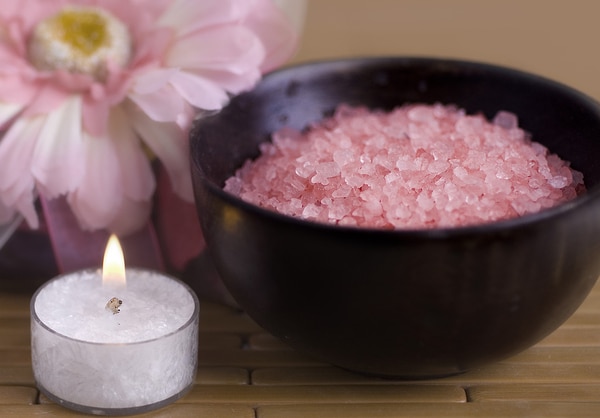Experts regularly issue warnings about the latest designer drugs to hit the streets. One of the most alarming drugs to emerge in recent years is synthetic cathinones. While they may go by the innocuous-sounding name of “bath salts,” the reality is that these dangerous and illicit drugs have been linked to an alarming number of emergency room visits and deaths. Here’s a closer look at bath salts, along with how to know if a loved one may be addicted to them.

These bath salts are not dangerous, as opposed to the illicit drugs known as “bath salts.”
What Are “Bath Salts”?
Human-made drugs known as bath salts are chemically related to cathinone, a stimulant found in the leaves of the khat plant, which produce a mild stimulant effect when chewed. However, synthetic variants can be stronger and more dangerous than the drug’s natural form. Common ingredients in bath salts include mephedrone, pyrovalerone, and methylenedioxypyrovalerone, AKA “MDPV,” a synthetic mood-altering drug and norepinephrine-dopamine reuptake inhibitor (NDRI).
Says the National Institute on Drug Abuse (NIDA), “’Bath Salts,’ the newest fad to hit the shelves (virtual and real), is the latest addition to a growing list of items that young people can obtain to get high. The synthetic powder is sold legally online and in drug paraphernalia stores under a variety of names, such as ‘Ivory Wave,’ ‘Purple Wave,’ ‘Red Dove,’ ‘Blue Silk,’ ‘Zoom,’ ‘Bloom,’ ‘Cloud Nine,’ ‘Ocean Snow,’ ‘Lunar Wave,’ ‘Vanilla Sky,’ ‘White Lightning,’ ‘Scarface,’ and ‘Hurricane Charlie.’”
Bath salts are usually in powder form and can be swallowed, snorted, smoked, or injected. They are often marketed and used as a less-expensive alternative to stimulants like cocaine and methamphetamine, and may often be included in products sold as Molly (MDMA).
Why Makes Bath Salts Such a Threat?
While all illicit drugs are dangerous, bath salts are of particular concern because so little is known about them. Continues NIDA, “Because these products are relatively new to the drug abuse scene, our knowledge about their precise chemical composition and short- and long-term effects is limited, yet the information we do have is worrisome and warrants a proactive stance to understand and minimize any potential dangers to the health of the public.”
One thing we do know is that bath salts not only have strong addictive potential, they also induce tolerance—meaning addicts need more drugs over time to get the equivalent response. Additionally, says Drugs.com, “Reports note intense cravings similar to what methamphetamine users experience. As ‘bath salts’ may be cut with other unknown and potentially addictive substances, the true magnitude of toxicity and addiction may be even higher.”
Symptoms of Bath Salts Addiction
Bath salts use may be accompanied by a number of signs and symptoms, including:
- increased heart rate
- agitation
- increased blood pressure
- hallucinations
- kidney pain
- increased body temperature and/or chills
- nausea
- confusion
- muscle tension
- paranoia
- suicidal thoughts
- delusions
- reduced need for sleep
People suffering from addiction to bath salts may be driven to aggressive acts toward others as well as themselves. Their cravings may be so strong that they are unable to stop themselves from these detrimental behaviors. If you notice any of the signs or symptoms of bath salts use in a friend or loved one, seek professional help immediately, as both the drug user and the people around the user are vulnerable to harm as long as the drug is being used.
Coping with Bath Salts Addiction
Unfortunately, there are no medications available to treat bath salts addiction. Factor in extremely strong withdrawal symptoms, including depression, anxiety, paranoia, difficulty sleeping, and tremors, and the challenges of dealing with bath salts addiction grow.
However, substance abuse treatment—cognitive-behavioral therapy, contingency management, motivational enhancement therapy, and other approaches—have been proven to be effective in treating and promoting recovery from bath salts addiction.

People who are addicted to bath salts do not have to face it alone.
While PBS NEWSHOUR once described bath salts as “the drug that never lets go,” it is possible for people addicted to bath salts to release themselves from addiction and recover.
We’re Here for You
Harris House can help. Contact us today to learn about our substance abuse treatment programs, and get on the road to true addiction recovery.







